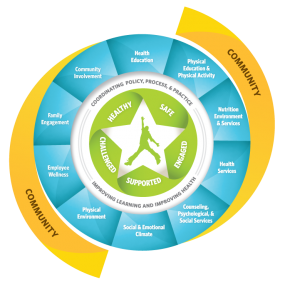Whole School, Whole Community, Whole Child
Establishing healthy behaviors during childhood is easier
and more effective than trying to change unhealthy behaviors during adulthood.
Schools play a critical role in promoting the health and safety of young people
and helping them establish lifelong healthy behavior patterns. Research shows a
link between the health outcomes of young people and their academic success. To
have the most positive impact on the health outcomes of young people,
government agencies, community organizations, schools, and other community
members must work together through a collaborative and comprehensive approach.
The Whole School, Whole Community, Whole Child, or WSCC
model, is the Centers for Disease Control and Prevention’s (CDC) framework for addressing
health in schools. The WSCC model is student-centered and emphasizes the
role of the community in supporting the school, the connections between health
and academic achievement and the importance of evidence-based school policies
and practices. The WSCC model has 10 components:

Implementation of the WSCC Framework
The coordination of policies, processes, and practices (represented by the white band around the five Whole Child Tenets) plays a critical role in creating and sustaining a school environment that supports both learning and health. Districts and schools can use the WSCC model to guide coordination and collaboration between component areas, facilitating awareness of issues across administrators, staff and community partners in different areas. As a result, schools are often able to leverage new resources, reduce duplication, and provide consistent messaging to create awareness and garner support for the identified priority areas.”
The Whole School, Whole Community, Whole Child: A Guide to Implementation – National Association of Chronic Disease Directors
Councils and Committees
Whole School, Whole Community, Whole Child
This resource provides an overview of the Whole School, Whole Community, Whole Child (WSCC) model itself and the model in action. There is step by step guidance for districts and schools to implement the model.
Assessment tools
Centers for Disease Control and Prevention's School Health Index
The School Health Index (SHI) is a self-assessment and planning guide that provides self-evaluation and planning tools for schools. It is available as an interactive, customizable online tool or downloadable, printable version. The SHI aligns with the Whole School, Whole Community, Whole Child (WSCC) Model.
Alliance for a Healthier Generation's Healthy Schools Program
The Healthy Schools Program helps schools and districts adopt policies and practices that result in healthier, happier students. This work aligns with the Center of Disease Control and Prevention (CDC) and Association of Supervision and Curriculum Development’s (ASCD) Whole School, Whole Community and Whole Child Model.
Action for Healthy Kids
Action for Healthy Kids provides an online guide for schools that includes tools and resources to create healthier learning environments for students, staff and communities. It is interactive and allows you to assess your current need and create a game plan on how to improve your school and community.
Healthy Out-of-School Time Assessment
Healthier Generation offers an evidence-based assessment tool to create a healthier Out-of-School Time environment for kids. Created in partnership with the National Afterschool Association’s Healthy Eating and Physical Activity Standards 2.0, the Healthy Out-of-School Time Assessment will help you track what you are already doing to support health and wellness at your site as well as highlight opportunities for growth and improvement.
Integration of the WSCC Model
The following resources contain evidence-based strategies and promising practices for using the WSCC approach across the school setting.
CDC's Virtual Healthy School
Through this virtual tool, learn about a healthy school that implements the WSCC model. Provides details of components that make up a healthy school, resources and downloadable files to best understand the WSCC model.
Integrating School Health Services Across the WSCC Framework
This one-pager explains the importance of school health services and shares evidence-based strategies and promising practices for using the WSCC approach across the school setting to promote health services and active, healthy lifestyles for students with chronic health conditions.
Integrating Nutrition Across the WSCC Framework
This one-pager explains the importance of providing students and staff with access to healthy foods and beverages, consistent messages about nutrition and opportunities to learn about and practice health eating. Shares evidence-based strategies and promising practices for using the WSCC approach to promote nutrition education and healthy eating behaviors across the school setting.
Integrating Out-of-School Time Across the WSCC Framework
This one-pager explains how the WSCC model can be used in Out-of-School Time (OST) programs. Provides evidence-based strategies and promising practices for using the WSCC approach to strengthen OST settings on school campuses and support student health and academic achievement.
Integrating Physical Education and Physical Activity Across the WSCC Framework
This one-pager shares the importance of implementing physical daily into school settings. Provides some evidence-based strategies and promising practices for using the WSCC approach to promote physical education and physical activity across the school setting.